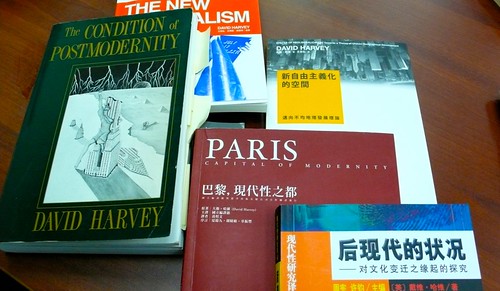
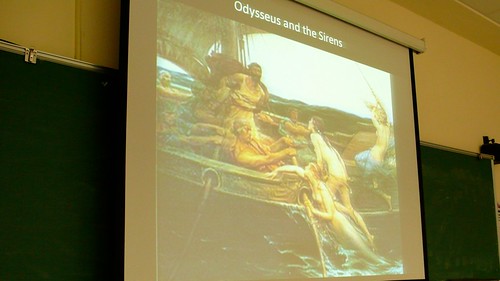
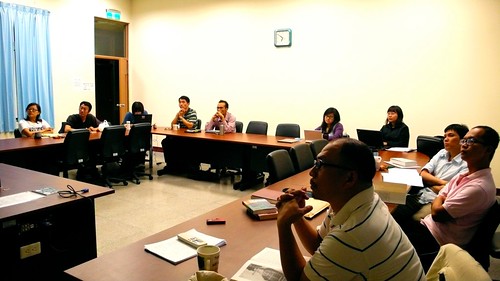

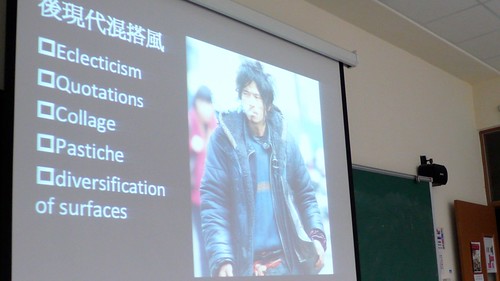
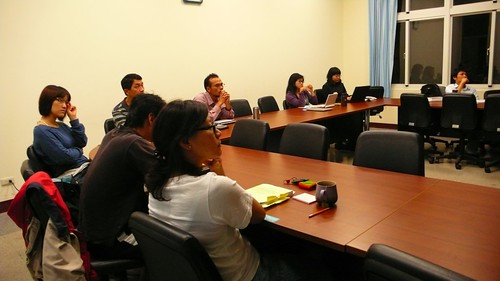
◎The Concept of Enlightenment
Enlightenment-科學、工具化的理性與進步的力量,對抗迷信/人定勝天
Emancipatory or oppressive? Utopian or dystopian?
The disenchantment of the world(除魅化)人的科學理性資質支配一切
盧梭(1712-1778)-人生而平等,打破君王概念。談人不平等的根源
盧梭影響法國大革命-自由、平等、博愛
Marx(1818-1883)
Nietzsche(1844-1900)-太陽神原則(規律) vs. 酒神原則-反啟蒙
Adorno and Horkheimer’s Dialectic of Enlightenment (1944, 1972)。
◎Modernity(現代性)/Modernism(現代主義)/Modernization(現代化)
法國巴黎-1848年為分界點
BEFORE | AFTER |
Romanticism (Chateaubriand, Hugo, George Sand) | The death of Romanticism-2月/6月革命 |
Utopianism(Blanqui, Saint-Simon, Fourier) | Flaubert, Baudelaire, Manet(一裸女在西裝男中) |
手工業 | Marx’s Communist Manifesto(1848) 後代把其成為資本主義宣言 |
拱廊(the Arcades) | 機械與現代工業 |
Sign(signifier與signified尚未嚴重斷裂) | 奧斯曼的林蔭大道 |
Old Paris | 萬國博覽會 |
Crisis of representation再現危機 | |
Spectacle景觀, 走馬燈 |
◎Modernity innovation before WWI-現代主義一直都在變,質疑現代
l Picasso’s Les Demoiselles d’Avignon(1907)
l Freud’s Interpretation of Dreams(1990)
l Proust’s Swann’s Way(1913)
l Joyce’s Dubliners(1914)
l Lawrence’s Sons and Lovers(1913)
l Mann’s Death in Venice (1914)
l 音樂Stravinsky’s The rite of Spring (1913);Schoenberg
l Saussure的結構語言學-一個字的意義建立在與其它字的關係
l 1913年第一道無線電波在Tour Eieffel發射-壓縮空間
◎Modernism in the inter-war period
l Heroic(reactionary, counter-revolutionary, myths-making) modernism-反動,反革命,神話塑造
l 義大利未來崇拜機器與速度
l 建築:包浩斯(1920s)-建築與科技獨大
l Fascism(Hitler and Mussolini)
l Benjamin’s “The Work of Art” essay(1935-6): (on “aura”光暈 and “the aestheticization of politics”)-aura把政治美學化(如達達主義)
◎Modernism after WWII
l Hegemonic, high, universal modernism
l Establishment arts(體制藝術)
l 先鋒文學被收編成大學教材
l 美國霸權崛起,冷戰開始,麥卡鍚主義
l 財團式的啟蒙主義
l 非關政治的現代主義-抽象表現主義
◎美國價值(American paradigm)=先驗價值
l 抽象的印象主義:artistic rebellion was transformed into aggressive liberal ideology
l Coca-Cola
l Chevrolets
l Suburban houses(乾淨,明亮皆只為表象 EX:電影時時刻刻)
l Cultural imperialism
l Corporate power
l 現代主義失去反叛性,變成精英式的權威
l 六O年代「新左」反彈
l Critique of everyday life (Lefebvre)
l 1968-全球抵制疆化的現代主義文化霸權
l 黑人/反帝國/學運
Modernism | Postmodernism |
Purpose | Play |
Hierarchy(high art vs. popular art) | Anarchy 無政府/多元 |
Centering | Dispersal |
Paradigm | Rhetoric |
Metaphor | Metonymy 換喻 (無指標原則) |
Signified | Signifier |
Grand narrative | Anti-narrative |
Paranoia | Schizophrenia 精神分裂(無主體) |
Determinacy | Indeterminacy |
The work of art | Text (Derrida’s Deconstruction) |
Production(author) | Consumption(reader as consumer) |
◎Important questions:
後現代主義是與現代主義絕裂還是只是反對a certain form of “high modernism”?
後現代主義為一種風格?只是種分歧?商業化?Neo-conservatism?
◎後現代的危機
l In defense of the Enlightenment project-Habermas
l 主體之死-分裂(馬克思-主體異化)
l 歷史感的消失,空間的扁平化,癱瘓的永恆當下(沒有歷史感的永恆當下)
l 肉身的奇觀化、擬象化
l 情感失序、假創傷現象氾濫
l 電視與消費市場、多元主義的關係
◎Fetishism戀物癖=anti-traces
l Benjamin, “The Storyteller” (生產痕被抺平,摧毀)
l Cindy Sherman(變裝始祖)的照片為表現的呈現,而無考慮到背後的社會意義
◎奇觀社會
l The organization of spectacle and theatricality
l 1960(運動)v.s. 1970 (博覽會)
l Jouissance
l 精神分裂的結果
◎From Fordism to flexible accumulation
l The publication of F. W. Taylor’s The Principles of Scientific Management in 1911, Henry Ford兩年後在Michigan設生產線
l 標準化
l 提高效率
l 壓低成本
l 二次世界大戰後成熟,the postwar boom, the Marshall Plan
l 美帝崛起
l 1973年石油危機引發經濟重組
l 彈性化
l 資本和硬體不再只存在母國,至世界各地佈局
l 職業結構的改變
l 高競爭力和高風險
◎Harvey’s position(i)
l 捍衛現代主義
l There were many cross-currents within modernism, and postmodernists echo some of them quite explicitly
l The meta-narratives that the postmodernists decry were much more open, nuanced, and sophisticated than the critics admit.
l 不能切斷與現代主義的連結,因有前才有後
l 後現代性只談破碎與混亂,未談現代性中永恆的特性
l Meta-theory cannot be dispensed with.
l 情感轉向,主體變得很重要
◎Harvey’s position(ii)
The de Man controversy
解構主義有幫助到後現代主義
l The rise of deconstructionism
l 所有元論述(meta-narratives)都是可疑的
l 語言遊戲(knowledge and meaning being reduced to a rubble of signifiers)
l Richard Rorty, Hillis Miller 為de Man辯解
◎Harvey’s position(iii)
l The new value placed on the transitory, the elusive and the ephemeral, the very celebration of dynamism, discloses a longing for an undefiled, immaculate and stable present (Habermas)
l 人的渴望-想要安定。回到人的根源,想要穩定的力量-找尋幫助的方法
l The rise of new localism and fanatic particularism in the age of fragmentation
l The opposition of Being (i.e. eternity, stability) and Becoming (i.e. ephemerality, relativility)
◎Harvey’s position(iv)
l 需看清楚後現代主義的現實,政治與經濟的現實未被討論
有何新轉向
l 後現代主義的文化詮釋霸權開始有式微的跡象
l 解構主義開始思索倫理學
l 歷史唯物主義的復興
l 重探啟蒙未竟之志業
沒有留言:
張貼留言